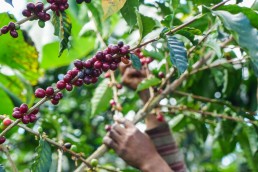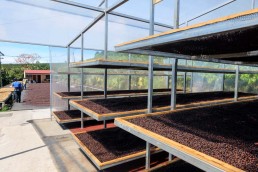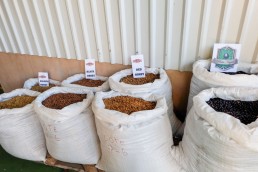this gorgeous black honey produced by las lajas micromill is next up on the rotating roster of our favourite coffees. sourced from our friends at Cafe Imports, this coffee is a delicate flavour bomb of red grape, melon & toffee. we hope you love it as much as we do!
tastes like: red grape, melon & toffee
origin: sabanilla de alajuela, central valley, costa rima
producer: las lajas micromill, finca los angeles
elevation: 1450m above sea level
varietal: catuai, caturra
process: black honey


Oscar & Francisca Chacon are 3rd-generation coffee producers committed to quality & innovation, and are best known for being among the first to produce honey coffees in Costa Rica. las lajas micromill is also one of the only certified-organic mills in the area & take their environmental impact very seriously. to mitigate their water usage, Oscar uses a penagos demucilaginator to de-pulp the coffee, and since the coffees are all natural or honey process, very little water is used at the mill.
harvesting and processing are overseen with great care by both Oscar & Francisca: during harvest, Francisca measures the brix of the cherry to determine optimal ripeness, picking will begin when the brix reads approx. 22°. harvesting by brix reading is also helpful as newer varieties sometimes ripen to different colours: using a refractometer helps keep the harvest at uniform ripeness, which is key when producing high-quality naturals and honeys.


las lajas began producing honey coffees in 2008, after an earthquake cut off the mill’s access to water for several weeks. Oscar had heard that in Brazil and Ethiopia they use pulped-natural & natural techniques to process coffees, so he tried it with their harvest that year. Oscar believes that just as the roast profile will change the flavour of a coffee, the drying curve also has an impact. he wants the drying to happen slowly, meaning that production is necessarily limited.
the Chacon’s produce several different types of honeys and naturals: for their honeys, 100% of the mucilage is left on the coffee, and the coffee is dried in different ways. they determine which process to use based on the weather on the day the coffee is harvested:
yellow honey: coffee is turned hourly on raised beds.
red honey: coffee is turned several times a day on the beds, but not as frequently as for yellow honey.
black honey: the coffee is only turned once per day.
